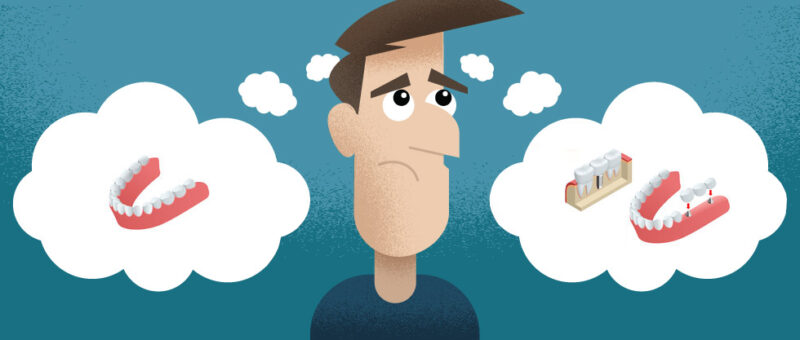While there are many causes for a toothache, abscesses are among the worst ways to get one. The pain that’s associated with a tooth abscess can be debilitating, radiating from the tooth to your neck or ear, and leaving it untreated can lead to a serious, life-threatening condition.
To learn more about tooth abscesses and how you can treat them with at-home remedies, continue reading below.
What Is a Tooth Abscess?
While many people get tooth abscesses, not very many of them know what they actually are. A tooth abscess is a pocket of pus that forms as a result of a bacterial infection. Additionally, there are two types of tooth abscesses, periapical and periodontal, that form in different areas of the mouth. A periapical abscess forms at the tip of the root, whereas a periodontal abscess forms in the gums at the side the root.
In this blog, we are going to focus mainly on periapical abscesses.
Tooth Abscess Symptoms
Recognizing the symptoms of a tooth abscess is essential for early intervention and treatment. When an abscess develops, it can present several key signs, including:
- Severe, persistent toothache or pain radiating to the jaw, neck, or ear
- Sensitivity to hot and cold temperatures
- Swelling in your face or cheek
- Fever and tender, swollen lymph nodes under your jaw or in your neck
- Difficulty breathing or swallowing
10 Natural Remedies for Tooth Abscess
Tooth abscesses are painful, but there are natural ways to lessen the discomfort you feel. One of the easiest methods to alleviate pain and try to stop the spread of an infection is to rinse your mouth with a warm saltwater solution. In addition to saltwater rinses, there are other at-home remedies you can use to treat and manage tooth abscesses. However, while these home remedies may provide temporary relief, they should not be used as a substitute for professional dental treatment. Find some of the most effective remedies below.
1. Saltwater Rinse
A saltwater solution is one of the best natural antibiotics for a tooth infection. A saltwater rinse will irrigate the mouth while also acting to kill some of the bacteria that can cause a tooth infection. Additionally, it can loosen and detach debris and pus in your mouth and around your tooth.
To create a saltwater rinse, combine ½ a teaspoon of regular table salt with a small cup of warm water and stir well. Rinse your mouth for a couple of minutes, swishing the solution thoroughly, and then spit it out. Repeat this process several times a day.
2. Hydrogen Peroxide
You likely have a bottle of hydrogen peroxide in your medicine kit or first aid cabinet, but did you know you can use it for more than minor cuts and scrapes? It has many household and first aid uses, but this simple first aid staple is one of the best remedies for an infected tooth. To make a hydrogen peroxide mouth rinse, combine a 1:1 ratio of peroxide and warm water, and then rinse your mouth with that a few times each day until your symptoms improve.
3. Baking Soda
Another great home remedy for tooth abscesses is baking soda. Rinsing your mouth with baking soda and warm water will help reduce the amount of plaque in your mouth, help relieve pain, and introduce antibacterial properties that will help fight your infection. If you have an abscess, you can also make a paste of baking soda and water and apply that directly to your tooth or gum instead of using the rinse.
4. Peppermint Tea Bags
Peppermint tea is known for its natural soothing properties, but it’s also a great remedy for mouth and tooth pain. When placed wet on a tooth abscess, cool peppermint tea bags can soothe pain considerably. This remedy, however, does not have any antibacterial properties, so you will need to combine this method with another one on our list to treat and cure the root cause of the infection.
5. Cold Compress
If your face is swollen as a result of your tooth infection, try applying a cold compress to the site. Cold compresses are perfect for bringing down swelling and temporarily numbing pain. For best results, we recommend finding a bendable cold pack or wrapping ice in a towel and leaving it on your face for a maximum of a few minutes. Again, this remedy does not help with treating your tooth abscess, so you’ll need to apply a cold compress in conjunction with another remedy on our list.
6. Garlic
Garlic has been revered for its medicinal properties, including its ability to fight bacterial infections. This makes it a potent remedy for tooth abscesses. Allicin, the main active compound in garlic, has significant antibacterial qualities that can aid in combating the bacteria causing the abscess.
To use garlic as a remedy, crush a garlic clove to create a paste and apply it directly to the affected area. Leave it on for a few minutes before rinsing with warm water. Repeat this process daily until the symptoms subside. Remember, the taste can be strong, and it may cause a burning sensation initially, but the benefits could be worth it.
7. Essential Oils
Essential oils, including tea tree, clove, and thyme, are widely recognized for their antimicrobial and anti-inflammatory properties. Tea tree oil is a potent antibacterial that can help disinfect the area around a tooth abscess. Clove oil, known for its numbing properties, can alleviate tooth pain, while thyme oil targets bacteria that cause infections. To use essential oils for a tooth abscess, dilute a few drops of the oil in a carrier oil, such as coconut oil, and apply it to the affected area with a cotton swab. Alternatively, adding a couple of drops to a glass of water can make an effective mouth rinse. However, be cautious and avoid ingesting these oils.
8. Coconut Oil
Coconut oil is another natural remedy that can be beneficial for oral health due to its antibacterial and anti-inflammatory properties. Oil pulling with coconut oil can help reduce bacteria in the mouth, decrease inflammation, and promote healing of the gum tissue. Swish a tablespoon of coconut oil in your mouth for 15-20 minutes, then spit it out and rinse your mouth with warm water. Performing this daily can help manage symptoms associated with a tooth abscess.
9. Aloe Vera
Aloe vera is renowned for its healing and soothing properties. For oral health, aloe vera gel can be applied directly to the infected area to reduce pain and inflammation. It’s also effective in killing bacteria causing abscesses due to its antibacterial properties. For a more soothing experience, refrigerate the aloe vera gel before applying it directly to the sore area or use it as a mouth rinse after diluting it with water.
10. Fenugreek Tea
Fenugreek has medicinal properties that can help treat a variety of ailments, including infections, due to its antibacterial properties. To use fenugreek tea for a tooth abscess, steep fenugreek seeds in hot water for several minutes, strain, and allow the tea to cool. You can then use the tea as a mouthwash or apply a soaked cotton ball directly to the affected area. Fenugreek tea can help reduce inflammation and fight the bacteria causing the infection.
Remember, while these natural remedies can provide temporary relief and aid in the healing process, they are not substitutes for professional dental treatment. If you have a tooth abscess or any other severe dental issue, it’s crucial to consult with a dentist to receive the appropriate care.
When to See a Dentist
Even though there are a lot of at-home remedies you can use for an abscessed tooth, it’s also important to see your dentist if your symptoms don’t improve. You’ll want to make sure that the infection that caused the abscess doesn’t spread to other areas of the mouth, and your doctor can prevent that from happening.
If you’re in need of a dentist, whether you have an abscessed tooth or not, and you’re located in the Westminster, MD area, contact All Smile Care today! Our friendly team is standing by, so be sure to call and get your appointment scheduled so you can start your journey to a clean and healthy mouth.
How a Dentist Will Treat a Tooth Abscess
When it comes to treating a tooth abscess, professional dental care is paramount. A dentist has several methods to treat an abscess, depending on the severity and location of the infection. Initially, your dentist may take an X-ray to determine the extent of the infection. Treatment typically involves eliminating the infection, preserving the tooth, and preventing complications. Common procedures include:
Draining the Abscess: The dentist will make a small incision into the abscess to drain the pus, which alleviates pain and reduces the infection.
Root Canal Treatment: If the abscess is due to an infection in the tooth’s pulp, a root canal may be necessary to remove the infected tissue and save the tooth.
Antibiotic Therapy: While not always needed, antibiotics may be prescribed if the infection is severe or has spread to other areas.
Tooth Extraction: In cases where the tooth cannot be saved, extraction may be the best option to remove the source of infection.
FAQs for At-Home Tooth Abscess Remedies
Can a tooth abscess go away naturally?
A tooth abscess will not go away on its own. While symptoms may temporarily subside, the infection typically persists until treated by a dental professional. Ignoring an abscess can lead to more severe health complications.
Can you get rid of a tooth abscess without antibiotics?
While antibiotics can help eliminate the infection causing a tooth abscess, they are not a standalone treatment. Draining the abscess and addressing the source of the infection, such as with a root canal or extraction, is necessary. Home remedies may provide temporary relief but cannot replace professional dental treatment.
What is the fastest home remedy for a tooth abscess?
Saltwater rinses are one of the fastest home remedies to help manage the discomfort and bacterial growth associated with a tooth abscess. However, this remedy provides temporary relief and should not be used as a substitute for dental treatment.
What is the best natural antibiotic for an abscessed tooth?
Garlic is often considered a natural antibiotic due to its antimicrobial properties. Applying garlic paste to the affected area or consuming garlic can help fight the infection. Nevertheless, consulting with a dentist for appropriate treatment is crucial.


